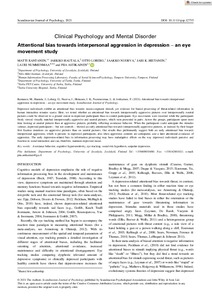Attentional bias towards interpersonal aggression in depression - an eye movement study
Rantanen Matti; Hautala Jarkko; Loberg Otto; Nuorva Jaakko; Hietanen Jari K.; Nummenmaa Lauri; Astikainen Piia
Attentional bias towards interpersonal aggression in depression - an eye movement study
Rantanen Matti
Hautala Jarkko
Loberg Otto
Nuorva Jaakko
Hietanen Jari K.
Nummenmaa Lauri
Astikainen Piia
WILEY
Julkaisun pysyvä osoite on:
https://urn.fi/URN:NBN:fi-fe2021093048669
https://urn.fi/URN:NBN:fi-fe2021093048669
Tiivistelmä
Depressed individuals exhibit an attentional bias towards mood-congruent stimuli, yet evidence for biased processing of threat-related information in human interaction remains scarce. Here, we tested whether an attentional bias towards interpersonally aggressive pictures over interpersonally neutral pictures could be observed to a greater extent in depressed participants than in control participants. Eye movements were recorded while the participants freely viewed visually matched interpersonally aggressive and neutral pictures, which were presented in pairs. Across the groups, participants spent more time looking at neutral pictures than at aggressive pictures, probably reflecting avoidance behavior. When the participants could anticipate the stimulus valence, depressed participants - but not controls - showed an early attentional bias towards interpersonally aggressive pictures, as indexed by their longer first fixation durations on aggressive pictures than on neutral pictures. Our results thus preliminarily suggest both an early attentional bias towards interpersonal aggression, which is present, in depressed participants, also when aggression contents are anticipated, and a later attentional avoidance of aggression. The early depression-related bias in information processing may have maladaptive effects on the way depressed individuals perceive and function in social interaction and can, therefore, maintain depressed mood.
Kokoelmat
- Rinnakkaistallenteet [27093]
